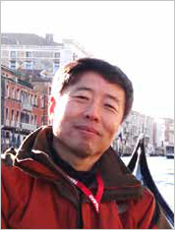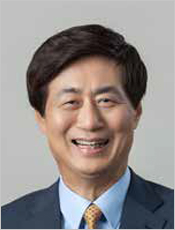About
Welcome Message
From the Conference Chair

Dear CKC 2020 Participants, Colleagues and the AKCSE Members:
COVID-19 pandemic has impacted the global community. I hope you are all doing well and staying safe.
On behalf of the Organizing Committee members, I am delighted to welcome all the delegates participants - either in-person face to face or online – to the 2020 Canada - Korea Conference on Science and Technology
(CKC 2020) organized by the Association of Korean-Canadian Scientists and Engineers (AKCSE) and t he
Korean Federation of Science and Technology Societies (KOFST). Despite COVID-19 pandemic, I am excited
to announce that CKC 2020 will take place early September both in-person and online, a new approach to
meet the new social norm.
The CKC is a multidisciplinary annual conference that aims to bring together experts and leaders from academia, industry, research institutes
and the governments of Canada and Korea to discuss up-to-date challenges in science, technology, and innovation (ST&I) and how we
can address the challenges together. Since the first conference, CKCs have served as a major platform for not only networking with professionals
from diverse areas of science and technology but also nurturing cutting-edge thought and exploring fruitful collaboration opportunities for
research and development between Canada and Korea.
Canada-Korea relations grew stronger with the establishment of a strategic partnership in 2014 and were accelerated by the Korea-Canada
Free Trade Agreement (FTA) in 2015. The STI Cooperation Agreement that sets the framework for substantial cooperation in these areas
was signed in December 2016 and has been in effect since May 2017. In December 2017, the first Joint Committee meeting and forum
were held in Seoul, Korea, followed by the second Joint Committee meeting during the CKC 2019 in Banff, Alberta.
This year’s conference theme, “ST&I Collaborations for an Agile Future,” highlights a goal shared by both signatories, and demonstrates
new steps taken toward bilateral R&D collaboration between the two countries. In addition to highlighting Canada-Korea collaborations for
agile technologies to address global challenges, the conference will also showcase and promote discussions for development of sustainable
materials, high value-added products, processing technologies, and clean technologies for Earth, energy and environment.
In 2011, the AKCSE hosted our first CKC in Vancouver, British Columbia with around 120 participants. In June 2019, we hosted the 9th
CKC in Banff, Alberta with nearly 500 participants. Without a doubt, the success of this conference ultimately depends on the participation
of scientists and engineers, young minds, passionate organizers, and the sponsoring research institutions and industry partners. As conference
co-chair of the CKC 2020, I would like to thank all participating organizations for their generous support for the conference, and all members
of the organizing committee and the conference IT committee for their tireless dedication and efforts.
Certain challenges and problems are expected as we host the combination of in-person and online conference for the first time. The Organizing
Committee will learn from this and expand the future online programs so that more scientists and engineers can participate in the conference,
as well as the lessons learned will improve and enhance the future conference in terms of quality and quantity.
I am grateful to have all of you joining us at this conference, and I wish you all a pleasant and fruitful time in early September 2020.

Jeong Woo Kim
Conference Chair and 22nd President of AKCSE
From the Conference Co-Chair

Distinguished participants, ladies and gentlemen, it is my great pleasure to welcome all
scientists and engineers from home and abroad to the 2020 Canada-Korea Conference
on Science and Technology (CKC-2020), which is held in a hybrid format encompassing
both in-person and virtual. I am grateful to President Jeong Woo Kim and the dedicated
members of the Association of Korean-Canadian Scientists and Engineers (AKCSE) for
successfully orchestrating this gathering.
This year's Conference was postponed due to the spread of COVID-19 pandemic that
has wreaked havoc around the world since last December. The venue had to be replaced
from a physical location of Halifax to a mix of online and partially offline event in select
regions. I owe the great hand of applause to AKCSE as well as to Korean and Canadian
scientists and engineers who were instrumental in pulling off a well planned event of this
magnitude amidst these trying period. As all participants joining from Canada are urged
to remain vigilant against the coronavirus, I trust that the safety will be given the highest priority during the Conference.
In the wake of the World Health Organizations's declaration of COVID-19 outbreak as a global pandemic in March,
the world is unquestionably divided into the pre- and post-pandemic eras. COVID-19 impacted our lives in a myriad
of ways by accelerating the offline-to-online conversion and fast-tracking platform technologies grounded on digital
ecosystem. By riding the waves of these technologies, Korean Federation of Science and Technology Societies (KOFST) is
also converting a number of official meetings into virtual events while maintaining a close collaboration with respective
overseas Korean Scientists and Engineers Associations (KSEAs) including AKCSE in leveraging non-contact technology
that facilitates encounters without a face-to-face contact.
For instance, on April 28th, KOFST along with 18 KSEAs held an online meeting, followed by the KOFST-KSEAs
joint international forum entitled 'The Key Takeaways in the National Containment Measures and the Development of
Treatments and Vaccines' held virtually on June 3rd in collaboration with the Korean Academy of Science and Technology
and the National Academy of Medicine of Korea. The joint forum was attended by eminent scholars representing diverse
academic fields in America, Europe and Asia along with Korean scientists and engineers prominent around the world. The
forum witnessed more than 200 participants from Korea although taken place late at night, which bespeaks a high degree
of public interest that transcends time and space in eradicating the global pandemic.
The theme of this year's CKC is 'ST&I Collaborations for an Agile Future'. As the world is set for a major reorganization
due to technological advances in AI, cloud, big data, robotics and VR, it is indispensable that we elevate Korea-Canada
ST&I cooperation to the next level in order to adapt to today's rapidly changing environment. The technology drivers
of the fourth industrial revolution shall move in the direction of pursuing the survival and prosperity of human beings,
particularly in the post COVID-19 era that gives renewed impetus to the role of science and technology. As a matter of
fact, core technologies in major industries such as non-contact services are progressing faster than anticipated. In light of
this, the role entrusted to Korean and Canadian scientists and engineers convened today are more significant than ever
in addressing challenges facing the international community by accelerating technology advancement and creating an
environment where humanity will live in a harmonious co-existence with science and technology.
As this year marks the 10th anniversary of CKC since its inception, I sincerely hope that CKC will be uniquely positioned
to lay a basis for joint research and make headway in science and technology advancements in two countries. With these
few words, I hope today's conference will stimulate lively discussions on how we should harness science and technology
to remove barriers among countries and facilitate innovative partnership at the same time. Rest assured, we, at KOFST,
will always remain committed to your noble work and are determined to be a reliable supporter for Korean scientists and
engineers residing in Canada to play an integral part in non-governmental diplomacy. I wish you all gathered in this year's
CKC the best of luck for your future endeavors. Thank you.
Woo Il Lee
President of Korean Federation of Science and Technology Societies
